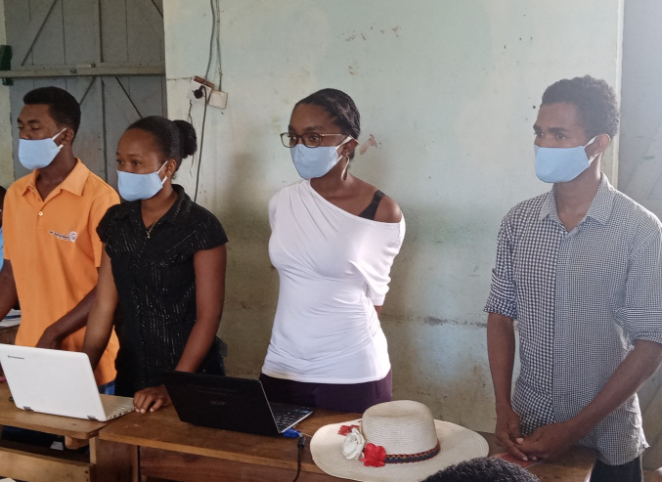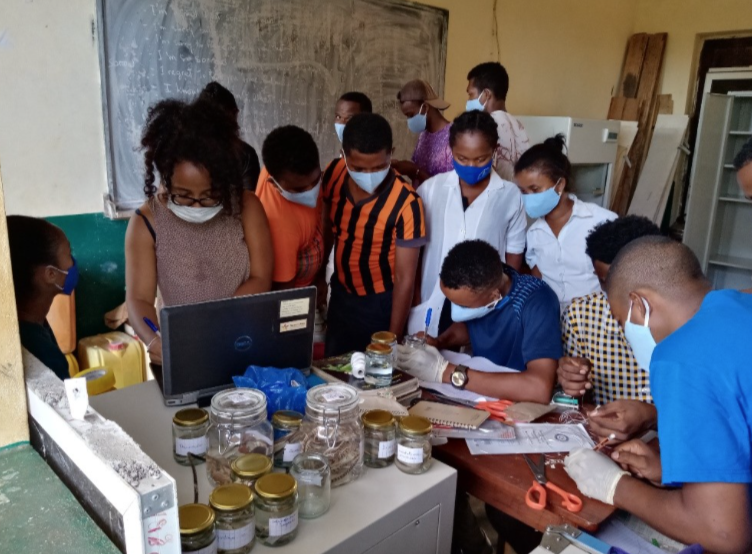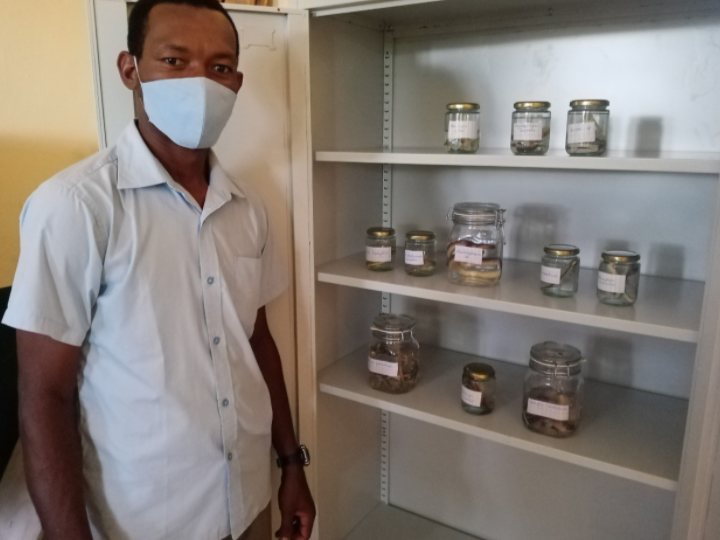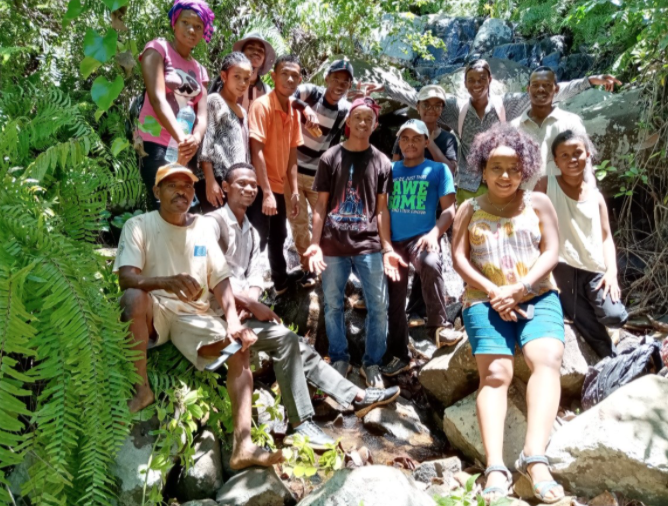Increasing inclusivity in STEM: Partnership between DLC and CURSA, the local university in the SAVA region
By Andolalao Rakotoarison, Tanjona Ramiadantsoa, Thio Rosin Fulgence, and James Herrera
In many low-income settings, like Madagascar, educational infrastructure is lacking to serve students further than primary school. Earning a high school degree is a huge achievement, out of reach for most students, and going to college is often a seemingly impossible dream. For those few that make it to the university level, their motivations and aspirations are high, but their financial and technical abilities lag behind. In Madagascar, there is better access to university resources in the capital city, Antananarivo, compared to more remote regions. If they have the opportunity to attend university, to complete a degree, students must conduct a research project. Students in the sciences, rarely have the financial means to do so, however, because research often requires expensive field or lab work. These limitations impede the growth of the scientific communities in low-resource countries.
In Madagascar, DLC has promoted many opportunities for exchange and partnerships with universities and students. We support workshops for students in diverse topics, actively recruit students for research projects and support their independent work, host scholarships for students to earn their Masters’s degree, and more. During the last two years, DLC-SAVA Conservation has engaged in new collaborative projects with the local university in SAVA region, CURSA (Centre Universitaire Régional de la SAVA). In this two-part series, we share how we led a multi-stage training program for senior students in the sciences.
Research design and natural history workshop
CURSA is a relatively small university and the only one in the SAVA region. Serving between 300-600 students, CURSA is developing new disciplines within their departments, and has a growing portfolio of research, conservation, and development projects, with teaching opportunities included in each. While coursework includes a core set of classes, to expand the diversity of topics that can be taught, the administrators invite professors from other universities to come to SAVA and teach1-2 week focused courses on their specialized disciplines. Doing so is financially prohibitive, however, because of the costs of transportation to the remote region and associated costs. This restricts who CURSA can invite, and how often.
In March 2021, DLC and CURSA partnered to host two Malagasy scientists: Drs. Andolalao Rakotoarison (who humbly prefers to be called Ando) and Tanjona Ramiadantsoa for a week-long workshop. Ando, originally from the SAVA, is a specialist in herpetology, studying the endemic reptiles and amphibians of Madagascar, especially focusing on frog species diversity. Tanjona is a theoretical and quantitative ecologist who applies advanced mathematical and statistical modeling to solve problems in ecology, evolution, and conservation. Both are early-career scientists who earned degrees abroad and have already developed an esteemed research career with numerous publications and postdoctoral research experience and were enthusiastic to visit the SAVA and teach the students at CURSA about research. The faculty was extremely motivated to host these experts and exchange research ideas for collaborative projects.
The five-day workshop began with introductory presentations by the students explaining their research interests to give the workshop leaders a chance to get to know them. Both Ando and Tanjona gave general overviews of the purpose of the workshop, especially starting with the basics: what is science? How do we know what is ‘true’ and supported by evidence and how can we distinguish from what is speculation, or biased opinion? What does a scientist do? Subsequent days focused on how to pose a research question, how to design a study, how to read and write a research article and give a scientific presentation, and more.

Students gave introductory presentations about their research interests, giving the workshop leaders more background and opportunities for feedback.
Ando presented about the importance of natural history collections, in which representative specimens of important species are stored for comparison and future reference. One of the CURSA faculty, Thio Rosin Fulgence, is also a herpetologist who has discovered a new frog species endemic to the SAVA region. To describe a new species, there should be a reference, or ‘type’ specimen to preserve information for comparing future finds on species diversity and distribution. Fulgence has collected dozens of specimens of different species, and students got hands-on experience curating the specimens, including writing ID tags for each one, storing them in ethanol and formalin, entering the data into a database, and proper specimen storage. DLC donated the materials needed for the collection, including high-quality metal cabinets, dissecting kits, and specimen jars. This collection will grow as more faculty and students are able to do fieldwork and create this independent repository.

Ando (at left on computer) taught students how to properly curate and catalogue a natural history collection. Each jar stores specimens of unique species that were collected during field missions. These specimens are critical for documenting the diversity of endemic species.

CURSA faculty Fulgence shows the new cabinets and jars for storing the CURSA Natural History Collection.
The students also had a field trip to a nearby forest that is being protected by local communities called Ambanitaza. Ando and Fulgence guided the students in herpetology data collection procedures and even observed two species of frogs (Stumpffia, which is one of Ando’s specialties, and Mantella, the Malagasy poison frog), and at least seven species of native chameleons, lizards, and geckos. The forest, managed by local communities, is extremely valuable because it is a sacred mountain and a key headwater for numerous rivers. Students had a chance to learn scientific methods as well as how local conservation activists are making positive changes in their region.

The workshop participants took a field trip to the local forest of Ambanitaza to practice field methods and learn how local communities are the stewards of the forest.
The workshop culminated in a second round of presentations by the students to now place the interests they had at the beginning within the framing that Ando and Tanjona taught. It was another opportunity for one-on-one consultation to hone the students’ research proposals. Ando and Tanjona expressed how well they felt the workshop went, and we all co-designed an evaluation assignment with a short-answer questionnaire to gauge how well students engaged with the material. The students performed extremely well, scoring high marks indicating that they understood the workshop material. They also gave their feedback on how to improve, and we learned that the students really want to learn statistics! While at the beginning many students are intimidated by math and statistics, Tanjona and Ando warmed them up and even got them excited and motivated to learn more.
Capacity strengthening in research design and grant writing
In these workshops, students gained hands-on skills and were hungry to apply their new knowledge to conduct their own projects. The financial challenge of actually conducting the research, however, left most students wondering how they could ever actually do their thesis.
To strengthen the capacity of Malagasy students and scientists to seek funding for their independent research, the DLC and CURSA hosted a small research grant competition. A Request for Proposals was developed and announced, in which senior students could submit a proposal and budget, following strict guidelines that we provided. The students were also tasked with seeking out a faculty mentor, and the CURSA administrators helped to pair students with faculty that had the appropriate expertise to provide guidance. Out of the 35 senior science students, 25 submitted applications. The DLC and CURSA staff found appropriate outside experts who could review the proposals and give their feedback, based on a predetermined rubric. Tanjona and Ando, who led the workshop, generously reviewed the proposals as well which gave them valuable feedback on what the students learned in the course. With all these expert opinions, 15 students were chosen whose projects were well designed, feasible, and demonstrated the students’ capabilities. How is it going so far? Find out in Part II!

